- Home
- Martin Cruz Smith
Wolves Eat Dogs Page 3
Wolves Eat Dogs Read online
Page 3
Arkady had tried to find Zhenya's father, even though the boy refused to supply the first name or help a sketch artist from the militia. Nevertheless, Arkady had gone through Moscow residence, birth and draft records in search of Lysenkos. In case the father was alcoholic, Arkady asked at drying-out tanks. Since Zhenya played so well, Arkady visited chess clubs. And, because Zhenya was so shy of authority, Arkady went through arrest records. Six possibles turned up, but they all proved to be serving long terms in seminaries, Chechnya or prison.
When Zhenya and Arkady were at the very top of the wheel, it stopped. The attendant on the ground gave a thin shout and waved. Nothing to worry about. Zhenya was happy with more time to scan the city, while Arkady contemplated the virtues of early retirement: the chance to learn new languages, new dances, travel to exotic places. His stock with the prosecutor was definitely falling. Once you'd been to the top of the Ferris wheel of life, so to speak, anything else was lower. So here he was, literally suspended. Poplar fluff sailed by like the scum of a river.
The wheel started to turn again, and Arkady smiled, to prove his attention hadn't wandered. "Any luck? You know, in Iceland there's a kind of imp, a sprite that's just a head on a foot. It's a playful imp, very mischievous, likes to hide things like your keys and socks, and you can only see it from the corner of your eye. If you look straight at it, it disappears. Maybe that's the best way to see some people."
Zhenya acknowledged not a word, which was a statement in itself, that Arkady was merely transportation, a means to an end. When the gondola reached the ground, the boy stepped out, ready to return to the shelter, and Arkady let him march ahead.
The trick, Arkady thought, was not to expect more. Obviously Zhenya had come to the park with his father, and by this point, Arkady knew exactly how they had spent the day. A child's logic was that if his father had come here before, he would come again, and he might even be magically evoked through a re-creation of that day. Zhenya was a grim little soldier defending a last outpost of memory, and any word he passed with Arkady would mute and dim his father that much more. A smile would be as bad as traffic with the enemy.
On the way out of the park, Arkady's mobile phone rang. It was Prosecutor Zurin.
"Renko, what did you tell Hoffman last night?"
"About what?"
"You know what. Where are you?"
"The Park of Culture and Rest. I'm resting." Arkady watched Zhenya steal the opportunity to take another turn of the fountain.
"Relaxing?"
"I'd like to think so."
"Because you were so wound up last night, so full of... speculation, weren't you? Hoffman wants to see you."
"Why?"
"You said something to him last night. Something out of my earshot, because nothing I heard from you made any sense at all. I have never seen a clearer case of suicide."
"Then you have officially determined that Ivanov killed himself."
"Why not?"
Arkady didn't answer directly. "If you're satisfied, then I don't see what there is for me to do."
"Don't be coy, Renko. You're the one who opened this can of worms. You'll be the one who shuts it. Hoffman wants you to clean up the loose ends. I don't see why he doesn't just go home."
"As I remember, he's a fugitive from America."
"Well, as a courtesy to him, and just to settle things, he wants a few more questions answered. Ivanov was Jewish, wasn't he? I mean his mother was." So?
"I'm just saying, he and Hoffman were a pair."
Arkady waited for more, but Zurin seemed to think he had made his point. "I take my orders from you, Prosecutor Zurin. What are your orders?" Arkady wanted this to be clear.
"What time is it?"
"It's four in the afternoon."
"First get Hoffman out of the apartment. Then get to work tomorrow morning."
"Why not tonight?"
"In the morning."
"If I get Hoffman out of the apartment, how will I get back in?"
"The elevator operator knows the code now. He's old guard. Trustworthy."
"And just what do you expect me to do?"
"Whatever Hoffman asks. Just get this matter settled. Not complicated, not drawn out, but settled."
"Does that mean over or resolved?"
"You know very well what I mean."
"I don't know, I'm fairly involved here." Zhenya was just finishing his circuit of the fountain.
"Get over there now."
"I'll need a detective. I should have a pair, but I'll settle for Victor Fedorov."
"Why him? He hates businessmen."
"Perhaps he'll be harder to buy."
"Just go."
"Do I get my files back?"
"No."
Zurin hung up. The prosecutor might have shown a little more edge than usual, but, everything considered, the conversation had been as pleasant as Arkady could have wished.
Bobby Hoffman let Arkady and Victor into the Ivanov apartment, moved to the sofa and dropped into the deep impression already there. Despite air-conditioning, the room had the funk of an all-night vigil. Hoffman's hair was matted, his eyes a blur, and tear tracks ran into the reddish bristle on his jowls. His clothes looked twisted around him, although the jacket given to him by Pasha was folded on the coffee table beside a snifter and two empty bottles of brandy. He said, "I don't have the code to the keypad, so I stayed."
"Why?" Arkady asked.
"Just to get things straight."
"Straighten us out, please."
Hoffman tilted his head and smiled. "Renko, as far as your investigation goes, I want you to know that you wouldn't have touched Pasha or me in a thousand years. The American Securities and Exchange Commission never hung anything on me."
"You fled the country."
"You know what I always tell complainers? 'Read the fine print, asshole!' "
"The fine print is the important print?"
"That's why it's fine."
"As in 'You can be the wealthiest man in the world and live in a palace with a beautiful woman, but one day you will fall out a tenth-floor window'?" Arkady said. "As fine as that?"
"Yeah." The air went out of Hoffman, and it occurred to Arkady that for all the American's bravado, without the protection of Pasha Ivanov, Bobby Hoffman was a mollusk without its shell, a tender American morsel on the Russian ocean floor.
"Why don't you just leave Moscow?" Arkady asked Hoffman. "Take a million dollars from the company and go. Set up in Cyprus or Monaco."
"That's what Timofeyev suggested, except his number was ten million."
"That's a lot."
"Look, the bank accounts Pasha and I opened offshore add up to about a hundred million. Not all our money, of course, but that's a lot."
A hundred million? Arkady tried to add the zeroes. "I stand corrected."
Victor took a chair and set down his briefcase. He gave the apartment the cold glance of a Bolshevik in the WinterPalace. From his briefcase he fished a personal ashtray fashioned from an empty soda can, although his sweater had holes that suggested he put out his cigarettes another way. He also had put, in a light-fingered way, drinking glasses from the evening before in plastic bags labeled "Zurin," "Timofeyev" and "Rina Shevchenko," just in case.
Hoffman contemplated the empty bottles. "Staying here is like watching a movie, running every possible scenario. Pasha jumping out the window, being dragged and thrown out, over and over. Renko, you're the expert: was Pasha killed?"
"I have no idea."
"Thanks a lot, that's helpful. Last night you sounded like you had suspicions."
"I thought the scene deserved more investigation."
"Because as soon as you started to poke around, you found a closet full of fucking salt. What is that about?"
"I was hoping you could tell me. You never noticed that with Ivanov before, a fixation on salt?"
"No. All I know is, everything wasn't as simple as the prosecutor and Timofeyev said. You were right about Pa
sha changing. He locked us out of here. He'd wear clothes once and throw them away. It wasn't like giving the jacket to me. He threw out the clothes in garbage bags. Driving around, suddenly he'd change his route, like he was on the run."
"Like you," Victor said.
"Only he didn't run far," Arkady said. "He stayed in Moscow."
Hoffman said, "How could he go? Pasha always said, 'Business is personal. You show fear and you're dead.' Anyway, you wanted more time to investigate. Okay, I bought you some."
"How did you do that?"
"Call me Bobby."
"How did you do that, Bobby?"
"NoviRus has foreign partners. I told Timofeyev that unless you were on the case, I'd tell them that the cause of Pasha's death wasn't totally resolved. Foreign partners are nervous about Russian violence. I always tell them it's exaggerated."
"Of course."
"Nothing can stop a major project – the Last Judgment wouldn't stop an oil deal – but I can stall for a day or two until the company gets a clean bill of health."
"The detective and I will be the doctors who decide this billion-dollar state of health? I'm flattered."
"I'd start you off with a bonus of a thousand dollars."
"No, thanks."
"You don't like money? What are you, communists?" Hoffman's smile stalled halfway between insult and ingratiation.
"The problem is that I don't believe you. Americans won't take the word of either a criminal like you or an investigator like me. NoviRus has its own security force, including former detectives. Have them investigate. They're already paid."
"Paid to protect the company," Hoffman said. "Yesterday that meant protecting Pasha, today it's protecting Timofeyev. Anyway, Colonel Ozhogin is in charge, and he hates me."
"If Ozhogin dislikes you, then I advise you to get on the next plane. I'm sure Russian violence is exaggerated, but it serves no one's purpose for you to be in Moscow." Ozhogin's displeasure was a cue for any man to travel to foreign climes, Arkady thought.
"After you ask some questions. You hounded Pasha and me for months. Now you can hound someone else."
"It's not that simple, as you say."
"A few fucking questions is all I'm asking for."
Arkady gave way to Victor, who opened a ledger from his briefcase and said, "May I call you Bobby?" He rolled the name like hard candy. "Bobby, there would be more than one or two questions. We'd have to talk to everyone who saw Pasha Ivanov last night, his driver and bodyguards, the building staff. Also, we'd have to review the security tapes."
"Ozhogin won't like that."
Arkady shrugged. "If Ivanov didn't commit suicide, there was a breach in security."
Victor said, "To do a complete job, we should also talk to his friends."
"They weren't here."
"They knew Ivanov. His friends and the women he was involved with, like the one who was here last night."
"Rina is a great kid. Very artistic."
Victor gave Arkady a meaningful glance. The detective had once invented a theory called 'Fuck the Widow', for determining a probable killer on the basis of who lined up first to console a grieving spouse. "Also, enemies."
"Everyone has enemies. George Washington had enemies."
"Not as many as Pasha," said Arkady. "There were earlier attempts on Pasha's life. We'd have to check who was involved and where they are. It's not just a matter of one more day and a few more questions."
Victor dropped a butt in the soda can. "What the investigator wants to know is, if we make progress, are you going to run and leave us with our pants down and the moon out?"
"If so, the detective recommends you begin running now," Arkady said. "Before we start."
Bobby hung on to the sofa. "I'm staying right here."
"If we do start, this is a possible crime scene, and the very first thing is to get you out of here."
"We have to talk," Victor told Arkady.
The two men retreated to the white runway of the hall. Victor lit a cigarette and sucked on it like oxygen. "I'm dying. I have heart problems, lung problems, liver problems. The trouble is, I'm dying too slowly. Once my pension meant something. Now I have to work until they push me into the grave. I ran the other day. I thought I heard church bells. It was my chest. They're raising the price of vodka and tobacco. I don't bother eating anymore. Fifteen brands of Italian pasta, but who can afford it? So do I really want to spend my final days playing bodyguard to a dog turd like Bobby Hoffman? Because that's all he wants us for, bodyguards. And he'll disappear, he'll disappear as soon as he shakes more money out of Timofeyev. He'll run when we need him most."
"He could have run already."
"He's just driving up the price."
"You said there are good prints on the glasses. Maybe there are some more."
"Arkady, these people are different. It's every man for himself. Ivanov is dead? Good riddance."
"So you don't think it was suicide?" Arkady asked.
"Who knows? Who cares? Russians used to kill for women or power, real reasons. Now they kill for money."
"The ruble wasn't really money," Arkady said.
"But we're leaving, right?"
Bobby Hoffman sank into the sofa as they returned. He could read the verdict in their eyes. Arkady had intended to deliver the bad news and keep going, but he slowed as bands of sunlight vibrated the length of the room. A person could argue whether a white decor was timid or bold, Arkady thought, but there was no denying that Rina had done a professional job. The entire room glowed, and the chrome of the wet bar cast a shimmering reflection over the photographs of Pasha Ivanov and his constellation of famous and powerful friends. Ivanov's world was so far away from the average Russian's that the pictures could have been taken by a telescope pointed to the stars. This was the closest Arkady had gotten to NoviRus. He was, for the moment, inside the enemy camp.
When Arkady got to the sofa, Hoffman wrapped his pudgy hands around Arkady's. "Okay, I took a disk with confidential data from Pasha's computer: shell companies, bribes, payoffs, bank accounts. It was going to be my insurance, but I'm spending it on you. I agreed to give it back when you're done. That's the deal I made with Ozhogin and Zurin, the disk for a few days of your help. Don't ask me where it is, it's safe. So you were right, I'm a venal slob. Big news. Know why I'm doing this? I couldn't go back to my place. I didn't have the strength, and I couldn't sleep, either, so I just sat here. In the middle of the night, I heard this rubbing. I thought it was mice and got a flashlight and walked around the apartment. No mice. But I still heard them. Finally I went down to the lobby to ask the receptionist. He wasn't at his desk, though. He was outside with the doorman, on their hands and knees with brushes and bleach, scrubbing blood off the sidewalk. They did it, there's not a spot left. That's what I'd been hearing from ten stories up, the scrubbing. I know it's impossible, but that's what I heard. And I thought to myself, Renko: there's a son of a bitch who'd hear the scrubbing. That's who I want."
Chapter Three
* * *
In the black-and-white videotape, the two Mercedeses rolled up to the street security camera, and bodyguards – large men further inflated by the armored vests they wore under their suits – deployed from the chase car to the building canopy. Only then did the lead car's driver trot around to open the curbside door.
A digital clock rolled in a corner of the tape. 2128. 2129. 2130. Finally Pasha Ivanov unfolded from the rear seat. He looked more disheveled than the dynamic Ivanov of the apartment photo gallery. Arkady had questioned the driver, who had told him that Ivanov hadn't said a word all the way from the office to the apartment, not even on a mobile phone.
Something amused Ivanov. Two dachshunds strained on their leashes to sniff his attaché case. Although the tape was silent, Arkady read Ivanov's lips: Puppies? he asked the owner. When the dogs had passed, Ivanov clutched the attaché to his chest and went into the building. Arkady switched to the lobby tape.
The marble lobby wa
s so brightly lit that everyone wore halos. The doorman and receptionist wore jackets with braid over not too obvious holsters. Once the doorman activated the call button with a key, he stayed at Ivanov's side while Ivanov used a handkerchief, and when the elevator doors opened, Arkady went to the elevator tape. He had already interviewed the operator, a former Kremlin guard, white-haired but hard as a sandbag.
Arkady asked whether he and Ivanov had talked. The operator said, "I trained on the Kremlin staircase. Big men don't make small talk."
On the tape, Ivanov punched a code into the keypad and, as the doors opened, turned to the elevator camera. The camera's fish-bowl lens made his face disproportionately huge, eyes drowning in shadow above the handkerchief he held against his nose. Maybe he had Timofeyev's summer cold. Ivanov finally moved through the open doors, and Arkady was reminded of an actor rushing to the stage, now hesitating, now rushing again. The time on the tape was 2133.
Arkady switched tapes, back to the street camera, and forwarded to 2147. The pavement was clear, the two cars were still at the curb, the lights of traffic filtering by. At 2148 a blur from above slapped the pavement. The doors of the chase car flew open, and the guards poured out to form a defensive circle on the pavement around what could have been a heap of rags with legs. One man raced into the building, another knelt to feel Ivanov's neck, while the driver of the sedan ran around it to open a rear door. The man taking Ivanov's pulse, or lack of it, shook his head while the doorman moved into view, arms wide in disbelief. That was it, the Pasha Ivanov movie, a story with a beginning and an end but no middle.
Arkady rewound and watched frame by frame.
Ivanov's upper body dropped from the top of the screen, shoulder hitched to take the brunt of the fall.
His head folded from the force of the impact even as his legs entered the frame.

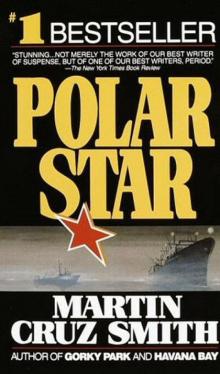 Polar Star
Polar Star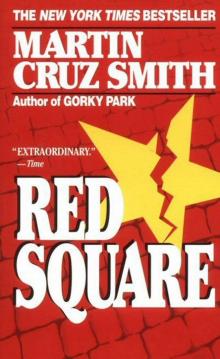 Red Square
Red Square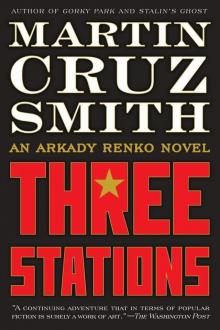 Three Stations
Three Stations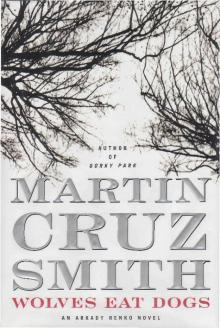 Wolves Eat Dogs
Wolves Eat Dogs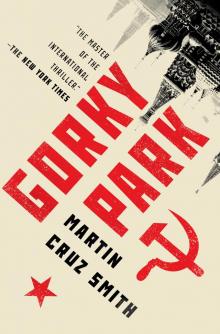 Gorky Park
Gorky Park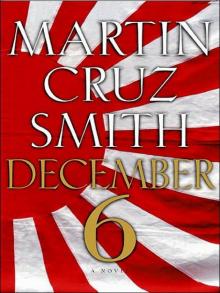 December 6
December 6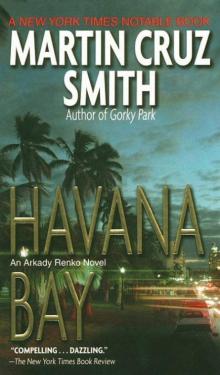 Havana Bay
Havana Bay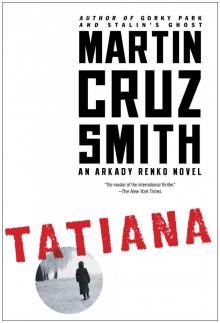 Tatiana
Tatiana The Girl From Venice
The Girl From Venice Stalin's Ghost
Stalin's Ghost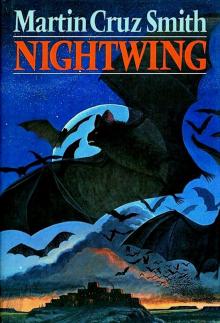 Nightwing
Nightwing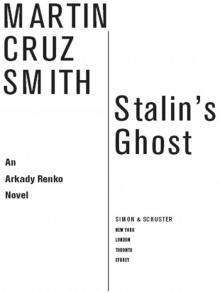 Stalin s Ghost
Stalin s Ghost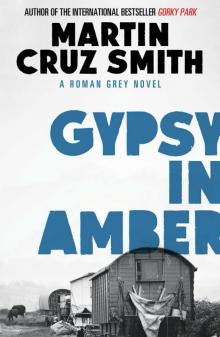 Gypsy in Amber
Gypsy in Amber Rose
Rose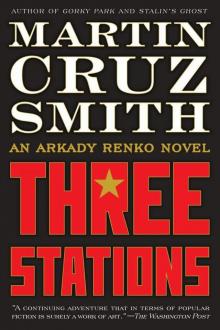 Three Stations: An Arkady Renko Novel
Three Stations: An Arkady Renko Novel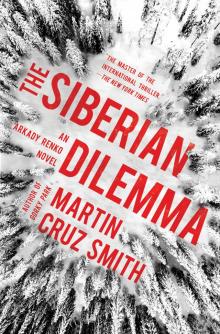 The Siberian Dilemma
The Siberian Dilemma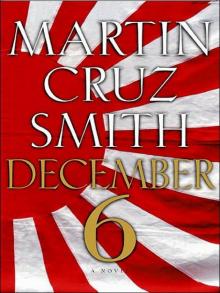 December 6 (V5.0)
December 6 (V5.0)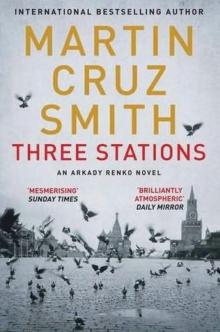 Three Stations ar-7
Three Stations ar-7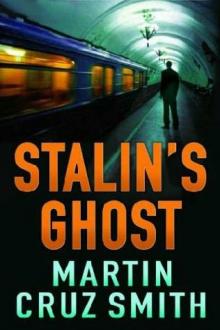 Stalin’s Ghost ar-6
Stalin’s Ghost ar-6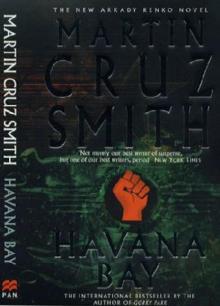 Havana Bay ar-4
Havana Bay ar-4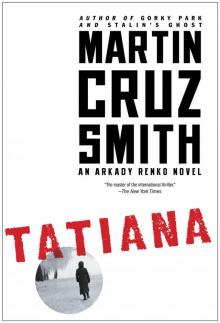 Tatiana ar-8
Tatiana ar-8